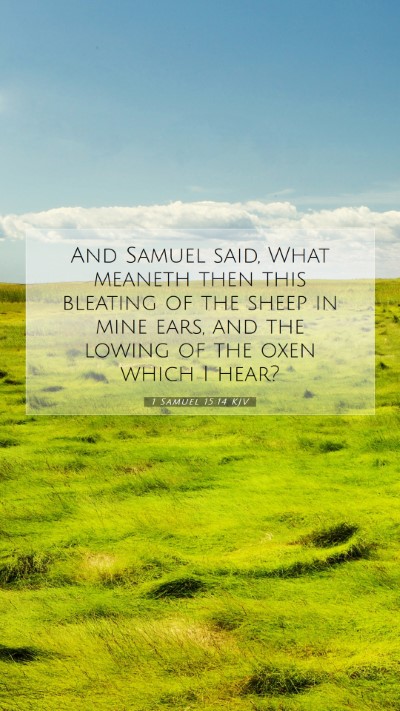1 Samuel 15:14 - Understanding the Meaning
The verse 1 Samuel 15:14 reads as follows:
"And Samuel said, What meaneth then this bleating of the sheep in mine ears, and the lowing of the oxen which I hear?"
This verse captures a moment of confrontation between Samuel and King Saul after Saul's disobedience to God's command to completely destroy the Amalekites and their livestock. This analysis combines insights from renowned public domain commentaries by Matthew Henry, Albert Barnes, and Adam Clarke to offer a comprehensive understanding of its significance in biblical context.
Contextual Background
1 Samuel 15 marks a pivotal episode in the biblical narrative. God had commanded King Saul through the prophet Samuel to annihilate the Amalekites, including their livestock, as a divine judgment for their sins. Saul, however, chose to spare the best of the sheep and oxen for religious sacrifices, believing that such an act would please the Lord.
Commentary Insights
- Matthew Henry: Henry emphasizes Saul's partial obedience and its implications, noting that God's commands must be followed in full, as any deviation suggests a lack of faith and respect for divine authority. The bleating of the sheep symbolizes guilt and the evidence of Saul's disobedience, highlighting the futility of Saul's rationalization for his actions.
- Albert Barnes: Barnes points out that the sounds of sheep and oxen were a direct indication of Saul's failure to fulfill God's command. His decision to retain some of the livestock under the guise of making sacrifices to God reveals a misunderstanding of the requirements of true worship. Barnes notes that God desires obedience rather than ritualistic acts.
- Adam Clarke: Clarke reflects on the significance of Samuel's inquiry into the sounds he hears, indicating that it serves as a divine revelation of Saul's wrongdoing. Clarke draws attention to the importance of understanding God's expectations and the consequences of failing to adhere to them, urging readers to recognize the serious nature of divine commands.
Theological Implications
This verse serves as a profound lesson on the nature of obedience to God. It illustrates a common struggle among believers: the temptation to interpret divine instructions through a personal lens. Saul's actions demonstrate how human reasoning can distort the clarity of God's commands, suggesting that believers should seek alignment with God’s will rather than rely on human logic.
Application of the Verse
In modern contexts, 1 Samuel 15:14 urges readers to reflect on how they respond to God's directives. Are we following God's Word fully, or are we justifying our preferences under the guise of spirituality? This verse challenges us to examine our motives in fulfilling God's will and emphasizes that genuine faith produces obedience.
Cross References
- 1 Samuel 15:23: "For rebellion is as the sin of witchcraft, and stubbornness is as iniquity and idolatry." This verse reinforces the notion that disobedience to God is serious and has grave consequences.
- Hebrews 10:26-27: This New Testament passage aligns with the theme of accountability before God and the seriousness of disregarding His instructions.
- 1 Samuel 13:13-14: Samuel's earlier confrontation with Saul about his previous unfaithfulness highlights a pattern of disobedience that leads to God's rejection of Saul as king.
Conclusion
In summary, 1 Samuel 15:14 is more than a historical account; it is a timeless warning about the nature of true obedience to God. Drawing upon rich commentaries, we see clearly that God's insights challenge believers to approach their spiritual life with sincerity and complete adherence to His Word.
This understanding of the Scripture encourages believers to form Bible study groups, utilize online Bible study tools, and engage in guided Bible study lessons that foster a deeper comprehension of biblical texts. Through careful analysis and application, one can unlock profound meanings of Bible verses and enrich their daily faith journey.


